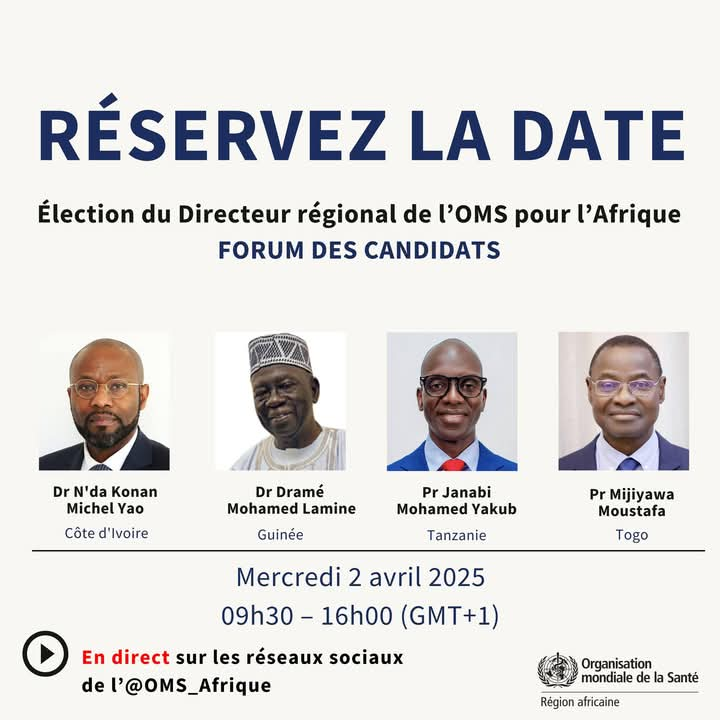As part of the process to nominate the next World Health Organization (WHO) Regional Director for Africa, a live candidates’ forum will be held on Wednesday, April 2, 2025, from 9:30 a.m. to 4:00 p.m. Brazzaville time.
The online forum, which was endorsed by WHO Member States in the Region, is one of the measures adopted to enhance the transparency of the nomination process. The forum will be chaired by the Honorable Louise Mapleh Kpoto, Minister of Health and Wellness of the Republic of Liberia and current First Vice-President of the WHO Regional Committee for Africa.
The forum is a platform that provides each candidate with the opportunity to present their experience and expertise, as well as their vision of the results they hope to achieve if appointed to the position of Regional Director, where they will be expected to fulfill the core mandates of WHO in the African Region.
The four candidates for nomination (listed in alphabetical order by country) are:
Dr. Michel N’da Konan Yao, proposed by Ivory Coast;
Dr. Mohamed Lamine Dramé, proposed by Guinea;
Prof. Janabi Mohamed Yakub, nominated by the United Republic of Tanzania;
and Prof. Moustafa Mijiyawa, proposed by Togo.
Each candidate will present a presentation of up to 20 minutes.
Questions for candidates
Each Member State participating in the online forum may ask questions if it wishes.
Member States are invited to indicate the candidate(s) to whom they wish to pose a question by writing to the Regional Office at GoverningBodiesAfro@who.int no later than 17:00 Brazzaville time on 26 March 2025. Tokens bearing the names of Member States wishing to pose questions will be placed in the designated bags (one container for each candidate). Member States that have nominated a candidate are not expected to pose questions to that candidate.
After each candidate has presented their oral statement, the Chairperson will randomly select tokens, one after the other, until the candidate’s time runs out. Each time a token is selected, the corresponding Member State will be invited to ask the candidate a question, which will be followed by a response.
Question and Answer Session
Member States will have a maximum of one minute to ask a single question. Multi-part questions will not be permitted. Candidates will have a maximum of three minutes to answer each question. Each interview will end when the 40-minute allotted time has elapsed, even if there are still outstanding questions. However, a candidate will be allowed to complete the question at the end of the 40-minute time limit.
Limiting speaking time
A timer will be displayed on the screen to help participants maintain the allotted speaking time during both parts of the interview.
The event will be streamed live in English, French and Portuguese on social media channels and on the WHO Regional Office for Africa.
WHO Regional Office for Africa







OTHER ARTICLES
Editorial — Prevent, inform, and act for women’s health in Africa
Kenya : Government Prioritises Maternal Health and Strengthens Support for Community Health Promoters
Strengthening pandemic prevention, preparedness, and response capacities in Senegal using the “One Health” approach